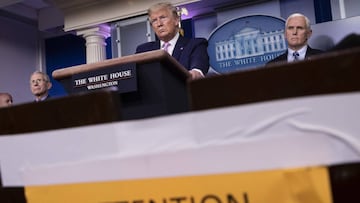Coronavirus: how will stimulus checks work in the United States?
US citizens will receive $1,200 per person from the coronavirus stimulus bill signed by President Donald Trump. We take a look at how it will work.

The United States government is preparing to send out a payment of $1,200 to US citizens amid the coronavirus pandemic but not everyone will receive it straight away. The first payments are expected to go out within three weeks to those people who the Internal Revenue Service (IRS) has direct deposit information already on file.
The $2.2 trillion stimulus bill signed by president Donald Trump earlier this week will start rolling out the payments by mid-April and a website is going to be set up for people to provide the necessary details the IRS requires so that it can start sending payments out to those members of the American public in need the money during the Covid-19 crisis.
IRS to send out 100 million checks to US citizens
When stimulus checks start going out across the country, undocumented immigrants won't be receiving them. But immigrant rights advocates say leaving this group out of the $2 trillion plan could put the whole country's health at risk as coronavirus spreads. https://t.co/3C3scNiNFE
— CNN (@CNN) March 27, 2020
It is expected that the IRS will begin by making about 60 million direct deposits but some people who are counting on this money will not receive it until mid-September. The IRS plans to send approximately 100 million checks out at a rate of 5 million per week, which could take 20 weeks, meaning that the final round of payments could go out as late as September.
Related stories
The IRS will use 2019 tax returns, for those who have filed them already, and for those that have not yet done this year's taxes their 2018 return will be used to calculate the amount of each payment. The money that US citizens receive from the scheme will not be subject to tax and people who owe back taxes will still receive the full $1,200.
The checks will be issued in reverse “adjusted gross income” order, which means that the people with the lowest income should receive it first. The IRS will be creating a portal later this month or in early May to let people update their direct deposit information and check on the status of their payment.

